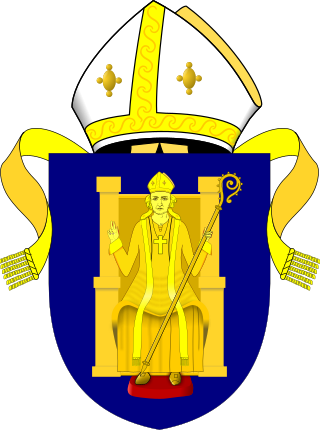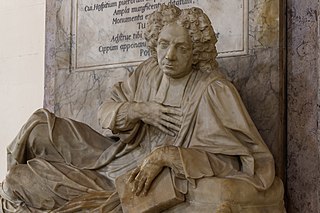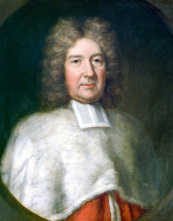Related Research Articles

The Diocese of Clogher is a diocese of the Church of Ireland in the north of Ireland. It is in the ecclesiastical province of Armagh. It covers a rural area on the border between Northern Ireland and the Republic of Ireland including much of south west Ulster, taking in most of the counties Fermanagh and Monaghan and parts of counties Cavan, Leitrim and Donegal.
Maurice Day was an Anglican bishop in the early 20th century.

Peter Drelincourt, was Dean of Armagh. He was the sixth son of Charles Drelincourt, minister of the reformed church in Paris, and graduated M.A. at Trinity College, Dublin, 1681, and LL.D. 1691.
John Roan,D.D. was a Church of Ireland Bishop of Killaloe.
Brabazon William Disney was an Irish Dean in the middle of the 19th century.
George Tottenham was Dean of Clogher from 1900 to 1903.

'Michael Ward (1643-1681) was a 17th-century Anglican bishop and academic in Ireland.
Ralph Lambert (1667–1731) was an Irish Anglican priest in the first half of the 18th century.
Francis George le Poer McClintock was Dean of Armagh from 1908 until his death.
Brice
Dionysius was appointed Dean of Armagh in 1301 and served until 1330.
Terence Daniel was a sixteenth century priest in Ireland.
Owen Wood was a sixteenth century priest.
Peter Ó Maolmhuaidh was appointed Dean of Armagh in 1487 and deprived in 1492. At some point he was restored and died in 1505.
Donald Macrivayr, a priest of the Diocese of Clogher, was appointed Dean of Armagh in 1492 At some point the previous incumbent Peter O'Mulmoy was restored.
Edmund Nachamayl was a long serving Dean of Armagh: he was in post from 1505 until his death on 21 January 1549.
John James Frey was born Johann Jacob Frey in Basel on 6 June 1606 as the son of a notable Basel family. He studied at the University of Basel, where he graduated MA in 1625. He then went to study in Geneva, Lyons and Oxford. From January 1629 he was tutor to Richard Boyle, 1st Earl of Burlington, the oldest son of Richard Boyle, 1st Earl of Cork, possibly recommended by Sir Henry Wotton. Frey was incorporated MA of Oxford as a member of Christ Church on 4 July 1629, and ordained as Anglican Deacon at Westminster in May 1630. He was in Basel as pastor at St. Margrethen for a few months and briefly matriculated for theology in Leyden. In 1632-1633, Frey toured France with young Richard Boyle, then stayed in London and Lismore, doing research for Archbishop James Ussher.
In the summer of 1635, after Dungarvan’s marriage, Frey returned to Switzerland, bringing back a library of about 130 English volumes which are held at the University of Basel. They include sermons and theology, but also poetry, plays, Walter Raleigh's History of the world, and a Second Folio of Shakespeare’s works. The books formed one of the foundations for the Frey-Grynaeum library in Basel, a building and collection established by the theology professor Johann Ludwig Frey, a great-grandson (1682-1759). About 30 volumes carry Frey's signature and some notes. These volumes include a Bible in Hebrew and Greek but also some quite surprising items for a Protestant minister: Francis Bacon's Advancement of Learning, Marcus Aurelius' Meditations in a critical English edition, the early Latin epigrams of Richard Crashaw, John Selden's Marmora Arundelliana and Plato’s Menexenos with several pages of notes.
Frey had returned to Basel to take up a position as Professor of Greek at the University of Basel, where he was much respected but felt “bound to Basel against my will”. He was longing to return to Britain but turned down a pressing offer to tutor the young semi-orphaned sons of George Villiers, 1st Duke of Buckingham. Instead, he agreed to become dean of Armagh in Ireland. on 15 November 1635, planning to move to Ireland in the spring of 1637. On 28 August 16163, the day that the Basel authorities decided to grant him leave to take up his post in Ireland, Frey died of a "fever" on 28 August 1636, just 30 years old.
Frey was intensely mourned by Swiss and English friends as a brilliantly gifted and lovable man. In 1653, James Ussher fondly remembered the intellectual exchanges he enjoyed when “our Frey” was among the living. Frey’s correspondence shows that his linguistic skills included - beyond the usual theologian’s tools of Latin, Greek, Hebrew, Syriac and possibly Arabic – fluent and idiomatic French, Italian and English. Ordained at age 23, he must have spoken English well enough to preach even then, and he corresponded in English with scholars such as Ussher and John Gregory as well as with aristocratic lords and ladies such as Frances Clifford and her daughter Elizabeth Boyle.
Edward How was an Anglican Archdeacon in Ireland in the late 17th-century.
Donal O'Heoghain was a priest in Ireland in the 15th century: a Canon of Armagh he was Dean of Clogher in 1411.
Peter O'Heoghain was a priest in Ireland in the late 14th century: a Canon of Armagh he was Dean of Clogher in 1390.
References
- ↑ “A New History of Ireland” Moody, T.W; Martin, F.X; Byrne, F.J;Cosgrove, A: Oxford, OUP, 1976 ISBN 0-19-821745-5
- ↑ "Fasti Ecclesiae Hibernicae: The succession of the prelates Volume 3" Cotton, H. p31/2 Dublin, Hodges & Smith, 1848-1878
- ↑ Fryde, E. B.; Greenway, D. E.; Porter, S.; Roy, I. (1986). Handbook of British Chronology (3rd ed.). Cambridge: Cambridge University Press. pp. 400–401. ISBN 0-521-56350-X.
- ↑ Armagh clergy and parishes : being an account of the clergy of the Church of Ireland in the Diocese of Armagh